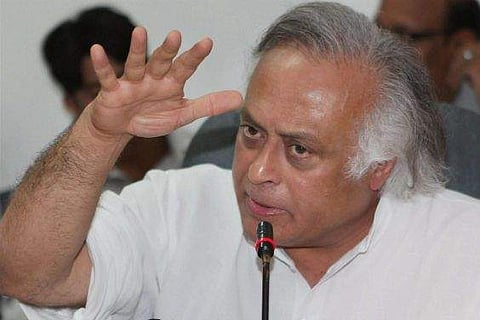

NEW DELHI: A Delhi court Saturday summoned senior Congress leader Jairam Ramesh, The Caravan's editor and its reporter as accused on April 25 in a defamation plea filed by NSA Ajit Doval's son Vivek against the magazine.
In his complaint, Vivek had said the magazine and Ramesh had attempted to "deliberately malign and defame" him to "settle scores with his father".
The three persons have been asked to appear before the court on April 25 by Additional Chief Metropolitan Magistrate Samar Vishal.
The court said in its order, "There exist sufficient grounds to proceed against all of them. They are summoned for a commission of an offence of defamation."
The Caravan had alleged that Vivek Doval, "runs a hedge fund in the Cayman Islands" which is "an established tax haven".
Vivek, in his complaint, has also said that Ramesh had held a press conference on January 17 reiterating the "baseless and unfounded facts" as narrated in the article.
The order also said the allegations of the magazine are prima facie defamatory and referred to Vivek and therefore, he was an aggrieved person.
It said at the initial stage, "the court has to look into the complainant and the statements/evidence of the witnesses and has to believe them".
"The court has to see whether if the impugned material is prima facie defamatory or not and whether the court has sufficient grounds to proceed with the case.
"The words are, if seen in the entire context of the things and evidence of the complainant and his witnesses, seem to be defamatory," the order said.
On February 11, two witnesses -- Nikhil Kapur and Amit Sharma -- had given court statements in support of the defamation complaint, saying the published article, and subsequent use of its content by Ramesh had resulted in huge unrest among investors of Vivek's firm.
Vivek had recorded his statement on January 30 before the court, saying all allegations were "baseless" and "false" and damaged his reputation in the eyes of family members and professional colleagues.
According to the complaint filed by him, the contents of the article present "no illegality" on his part, but the entire narration has been presented in a manner, which suggests "wrongdoings" to readers.
The complaint said the article has been used as a political tool to "foster in unscrupulous hands" to "seek vendetta and wreak vengeance".
The court, in its order, said although their was no direct allegation in the article so worded or phrased, but according to the complainant a number of questions have been raised insinuating and imputing such wrongdoings, which leaves the public with a certain negative perception of his and his family members' actions, which was the anticipated and calculated reaction at which the article was aimed at.
The defamatory statements have been published and widely read, particularly by the witnesses in the case who deposed before the court that his reputation was lowered in their estimation, it said.
The order said Vivek has demonstrated in his evidence how these allegations made in the article as well as in the press conference were false and defamatory.
In order to decide whether to summon respondents for trial in a defamation matter, the existence of only a prima facie case to summon them has to be seen in contrast to the standard of proof "beyond reasonable doubt" required for conviction, it said.
The testimony of the witnesses in the case also proved that the reputation of Vivek was lowered in their estimation, which was an essential requirement of the offence of defamation, according to the order.
It stated that "a person cannot be defamed in his own eyes" and "a man's reputation is the estimate in which others hold him, not the good opinion which he has of himself".
"There has to be other reasonable, prudent and right-thinking members of society, who says that the reputation of a person aggrieved is lowered in their estimation," it said.
In defamation cases, one of the test is whether under the circumstances in which the writing was published, reasonable men to whom the publication was made would be likely to understand it in a defamatory sense, the court said.
"The intention of the maker of the statement is an important factor in deciding. Of course, the contents of the publication are primary considerations but the intention and consequent harm is also equally important.
It is not always necessary that the publication alleges some illegality on the part of the person defamed," the order said.
Every person has a right to have his reputation preserved inviolate and this is acknowledged as an inherent personal right and an element of personal security, it said.
Though the right to free speech and expression is also a fundamental right, but it is subjected to the reasonable restrictions imposed by law of defamation.
"Reputation is not only the salt of life, but also the purest treasure and the most precious and cherished value this side of the grave. The right to enjoyment of a private reputation, unassailed by malicious assault on it is of ancient origin, and is necessary to human society," the order said.
It said the essence of the offence of defamation consisted in its tendency to cause pain which was felt by a person who knew himself to be the object of the unfavourable sentiments of his fellow-creatures.